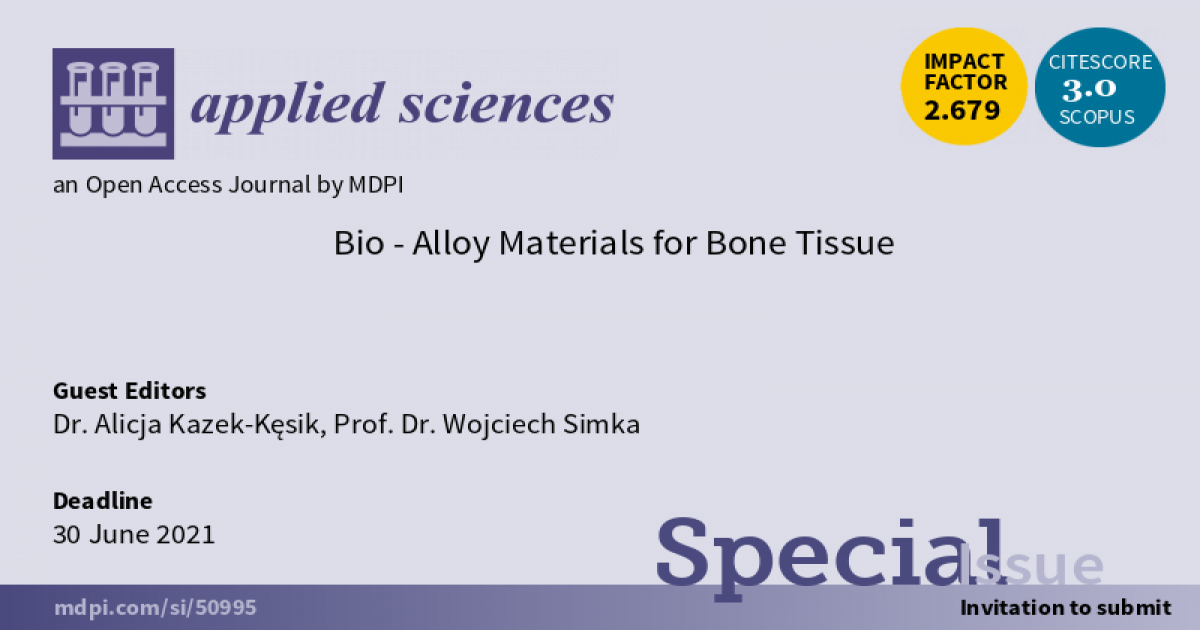Bio-Alloy Materials for Bone Tissue
A special issue of Applied Sciences (ISSN 2076-3417). This special issue belongs to the section "Applied Biosciences and Bioengineering".
Deadline for manuscript submissions: closed (30 June 2021) | Viewed by 991

Special Issue Editors
Interests: anodization; biomaterials; bioactivity; material characterization; nanomaterials; X-ray diffraction; surface characterization; coating film deposition; microstructure; SEM analysis; materials chemistry
Interests: coating; material characterization; materials; nanomaterials; microstructure advanced materials; corrosion; plasma electrolytic oxidation; titanium; dental implants
Special Issues, Collections and Topics in MDPI journals
Special Issue Information
Dear Colleagues,
Metal-based implants for bone tissue are commonly made from materials such as 316L stainless steel, titanium or titanium alloys. However, new materials with mechanical properties closer to natural bone are desirable. Materials used as long-term implants should be biocompatible and composed of non-toxic and non-allergic compounds. Because it is desirable to enhance the implant surface bioactivity, the surface is often modified to prevent bacteria adhesion, as well. Degradable metallic implants are considered to be part of a new generation of materials that can be used as dental implants or orthopedic implants. However, new materials with desirable mechanical properties (e.g., elasticity, yield stress, ductility, toughness, hardness), compatibility (cytocompatibility, tissue reaction, physical and chemical properties, degradation, bacteriostatic properties), and an easy manufacturing process are still being sought as novel materials. In this Special Issue, we invite submissions that explore the development of various metallic biomaterials for dental implants or orthopedic applications. Analyses of the results of a metal surface treatment to form ceramic or polymer coatings on the new materials are also welcomed.
Dr. Alicja Kazek-Kęsik
Prof. Dr. Wojciech Simka
Guest Editors
Manuscript Submission Information
Manuscripts should be submitted online at www.mdpi.com by registering and logging in to this website. Once you are registered, click here to go to the submission form. Manuscripts can be submitted until the deadline. All submissions that pass pre-check are peer-reviewed. Accepted papers will be published continuously in the journal (as soon as accepted) and will be listed together on the special issue website. Research articles, review articles as well as short communications are invited. For planned papers, a title and short abstract (about 250 words) can be sent to the Editorial Office for assessment.
Submitted manuscripts should not have been published previously, nor be under consideration for publication elsewhere (except conference proceedings papers). All manuscripts are thoroughly refereed through a single-blind peer-review process. A guide for authors and other relevant information for submission of manuscripts is available on the Instructions for Authors page. Applied Sciences is an international peer-reviewed open access semimonthly journal published by MDPI.
Please visit the Instructions for Authors page before submitting a manuscript. The Article Processing Charge (APC) for publication in this open access journal is 2400 CHF (Swiss Francs). Submitted papers should be well formatted and use good English. Authors may use MDPI's English editing service prior to publication or during author revisions.
Keywords
- biomaterials
- biodegradation
- bone tissue
- surface treatment
- bioactive compounds
- coatings
Benefits of Publishing in a Special Issue
- Ease of navigation: Grouping papers by topic helps scholars navigate broad scope journals more efficiently.
- Greater discoverability: Special Issues support the reach and impact of scientific research. Articles in Special Issues are more discoverable and cited more frequently.
- Expansion of research network: Special Issues facilitate connections among authors, fostering scientific collaborations.
- External promotion: Articles in Special Issues are often promoted through the journal's social media, increasing their visibility.
- Reprint: MDPI Books provides the opportunity to republish successful Special Issues in book format, both online and in print.
Further information on MDPI's Special Issue policies can be found here.






